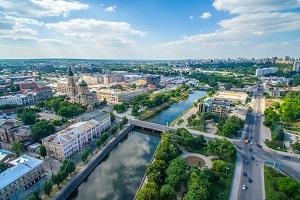
The COVID-19 pandemic has had a multi-dimensional effect on the UNECE region, causing the worst economic contraction in decades. Cities and urban areas, with their high population density and interconnectivity, were particularly vulnerable and encountered major disruptions. The pandemic impacted urban economies, equity, employment, public services, infrastructure and transport, affecting all individuals, especially vulnerable households, businesses and workers.
A UNECE Regional Policy Brief published today analyses the impact of the pandemic on urban economic resilience and formulates policy recommendations in four thematic areas:
• Urban governance
• Socio-economic impacts of the COVID-19 pandemic
• Nature-based solutions and climate neutrality for environmental quality
• Urban planning and transportation policies and programmes
To recover from the pandemic and prepare for future crises and emergency situations, cities have introduced digital technologies to increase access to public services, transformed public areas into new green spaces, and encouraged the resumption of economic growth by prioritizing the provision of healthcare and providing financial aid to small businesses. The Brief presents concrete policy recommendations, best practice examples, tools and mechanisms which cities can use to support sustainable urban economic recovery.
Proposed solutions include funding for nature-based solutions, upgrading public spaces, providing accessible infrastructure and expanding reliable and resilient public transport.
Many cities in the UNECE region experienced an 80-90 per cent reduction in the use of public transport services as a result of COVID-19, with societies today still showing a reluctance to use public transport. This shift to private cars creates a threat of increased road traffic and pollution, as well as a drop in revenue for public transport providers. The policy brief promotes compact and dense urban form as a solution to these challenges through the reduction in automobile dependence, increased safety and social cohesion, growth in commercial dynamism, and greater pedestrian access to amenities.
Other cities in the region promote the use of information and communication technologies because of their pivotal role in emergency response and ability to help manage cities more holistically and efficiently. Digital governance tools, such as contact tracing and online reservation applications, have been used to monitor contagion risks while simultaneously enabling continuity of key public services and economic activity.
Nature-based solutions can be multi-functional, cost effective and provide a wide range of benefits, from improving public health and regenerating urban spaces to reducing energy costs and pollution. They are also an excellent way to combat the urban “heat island effect” in which cities are exposed to higher heat levels as they grow, increasing electricity demand and GHG emissions. Poznan, Poland strengthened its urban resilience by identifying areas that could benefit from green spaces through ecosystem services mapping. These areas were then enhanced through new green infrastructure and recreational facilities.
To respond to the challenges of service accessibility brought on by the pandemic, the city of Milan implemented its Adaptation Plan, encouraging the flexible use of existing infrastructure and amenities. Through the plan, Milan created pedestrian zones and promoted additional space for outdoor restaurants and cafes by lowering city speed limits to 30km/h. Urban actions like those in Milan serve to reduce movement and diversify mobility supply. Similarly, Barcelona is redesigning streets to make more space for pedestrians and cyclists, improving energy efficiency in buildings and adding more social, cultural and sports outlets in response to climate change and COVID-19.
According to the regional policy brief, COVID-19 recovery and climate change mitigation plans should encourage walkable neighbourhoods and street connectivity, provide diverse housing adapted to local needs, and foster employment and consumption. Overall, the regional policy brief stresses that successful and impactful solutions to challenges introduced by the pandemic must be comprehensive, people-centred and share knowledge and best practices.
In this challenging context, cities urgently need to build urban economic resilience as a crucial part of their recovery plans. To achieve this, UNECE, together with the other four UN regional commissions, UN-Habitat and UN Capital Development Fund are implementing a global project addressing economic and financial resilience of cities, focusing explicitly on leveraging digital and technology-based solutions and opportunities within the green economy. The Rapid Response project “Building urban economic resilience during and after COVID-19" focuses on strengthening the capacities of local governments in 16 cities globally, with 3 in the UNECE region: Tirana (Albania), Bishkek (Kyrgyzstan), and Kharkiv (Ukraine).
The findings of the Brief will be further discussed at the eighty-second session of the UNECE Committee on Urban Development, Housing and Land Management on 6-8 October 2021 in Geneva, Switzerland. It will be used to inform the development of a global policy dialogue on urban economic recovery and resilience.

